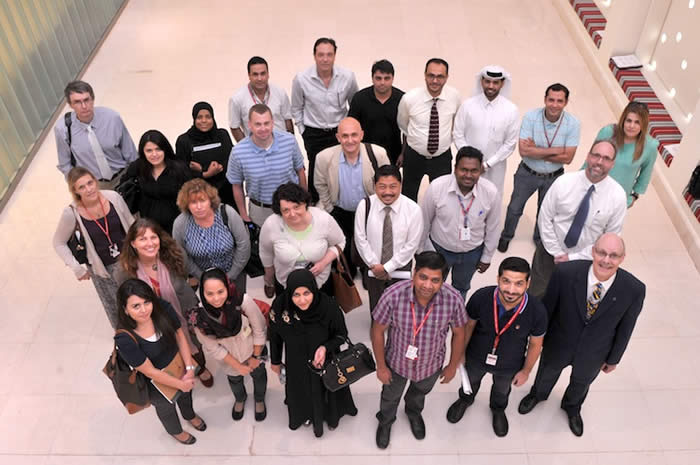Visiting expert delivers biosafety seminars
June, 2014

The delegates learned how to handle blood-borne pathogens in the laboratory among other skills.
WCMC-Q has sponsored four days of biological safety training for researchers, educators, healthcare professionals, and clinical laboratory personnel working in Qatar.
The fourth annual installment of the WCMC-Q Research Safety Training Seminars provided three sessions on biological safety principles and practices and a fourth session on recombinant DNA and Institutional Biosafety Committee (IBC) program implementation. Hamad Medical Corporation (HMC) hosted one of the seminars, and WCMC-Q hosted Supreme Council of Health (SCH) Medical Commission staff for a Saturday training seminar.
The seminars, delivered by visiting biosafety professional Dr. Richard W. Gilpin, a 25-year member of the American Biological Safety Association, shared practical advice about minimizing risks while working in the laboratory.
Attendees learned how to safely handle blood-borne pathogens in the laboratory, how to carry out risk assessments, which personal protective equipment to use for particular research procedures, and how to manage vaccination plans for researchers who work with infectious biological materials, among many other topics.
The seminars also explained the procedures and protocols researchers must follow in order to comply with a variety of regulatory bodies, such as the US National Institutes of Health and the U.S Food and Drug Administration.
Dr. Gilpin, who previously served as biosafety officer at Johns Hopkins University and the Johns Hopkins Hospital, Baltimore, explained the challenges facing medical researchers in Qatar relating to health and safety.
He said: “The difficulty all research communities outside of the United States experience is that the regulatory bodies that govern research protocols are generally located within the U.S. Furthermore, most of the experts who are able to advise researchers about how to meet the required standards are based in the U.S, Europe or the UK.
“However, my impression is that Qatar has managed to establish significant expertise in research within the country and has also developed strong links with the research community in the U.S, so these difficulties can certainly be overcome and the situation for researchers in Qatar looks extremely positive.”
The seminar program was coordinated by WCMC-Q director of environmental health and safety Tom Doyle, in collaboration with Dr. Ahmed Ismail, chief of laboratory services at the Supreme Council of Health, and Dr. Ramzi Mohammad, interim director of the Translational Research Institute, head of research-medicine, and head of HMC’s Biosafety Committee.
More than 350 professionals engaged in research, science education, and healthcare at all levels attended the four training sessions.
Mr. Doyle said: “The response to the seminars from the research and healthcare community in Qatar has been extremely receptive.
“WCMC-Q values its partnership with HMC and SCH. This course is beneficial for all institutions, and whenever we can partner together on important subjects like biological safety, all in an effort to advance the vision and mission of Qatar in helping build a knowledge-based society, it is beneficial for the entire country.”
